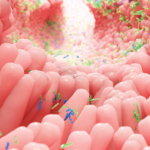 Despite extensive genetic studies of patients with rheumatoid arthritis (RA), researchers cannot successfully predict which individuals will ultimately develop disease. This knowledge gap has led many to assume that environmental triggers must be important for RA pathogenesis. Others have even proposed that the gut microbiota can provide such a trigger. This hypothesis is based on data indicating that gastrointestinal microbial imbalance can contribute to the development of autoimmune diseases. More specifically, not only do mice with clinical arthritis exhibit dysbiosis, but so, too, do patients with symptomatic RA.
Despite extensive genetic studies of patients with rheumatoid arthritis (RA), researchers cannot successfully predict which individuals will ultimately develop disease. This knowledge gap has led many to assume that environmental triggers must be important for RA pathogenesis. Others have even proposed that the gut microbiota can provide such a trigger. This hypothesis is based on data indicating that gastrointestinal microbial imbalance can contribute to the development of autoimmune diseases. More specifically, not only do mice with clinical arthritis exhibit dysbiosis, but so, too, do patients with symptomatic RA.
Intestinal Dysbiosis Triggers Mucosal Immune Response
New research in mice suggests intestinal dysbiosis triggers a mucosal immune response that stimulates the T and B cells critical for the development of inflammatory arthritis. Widian K. Jubiar, MS, MD, postdoctoral fellow at the University of Colorado School of Medicine in Aurora, Colo., and colleagues used the murine collagen-induced arthritis (CIA) model to examine how both the microbiota and mucosal immune response change over time. They published their results March 13 in Arthritis & Rheumatology.1
“From our study and the ongoing studies of many others in rheumatology and other fields, we know that there is an important role of the microbiome in educating our immune system,” writes co-author Kristine Kuhn, MD, PhD, assistant professor of medicine at the University of Colorado School of Medicine in an email interview with The Rheumatologist. “We believe that continued work in these areas will reveal unique pathways in how gut bacteria influence the development of many different autoimmune diseases.”
The Study
Dr. Jubiar and colleagues used the CIA model that induces arthritis in genetically susceptible DBA/1J mice via immunization with bovine collagen type II (CII) emulsified in complete Freund’s adjuvant (CFA). The mice are immunized on Day 0 and Day 21 and develop arthritis between Days 23 and 24. Researchers measured disease severity every two days by determining a mean clinical score from the animal’s four paws with 0=normal, 1=erythema, 2=swelling and 3=ankylosis. Not all of the mice treated in this way develop arthritis. Previous studies have shown the mice that developed disease had intestinal dysbiosis relative to those that were immunized and did not develop observable joint swelling.
In the current study, the investigators hypothesized the microbiota could modulate immune responses that lead to autoimmune arthritis. If true, then it should be possible to identify the critical point at which dysbiosis-modulated disease activity occurs. The team sought to identify this time point.
The researchers evaluated the microbiota via 16S rRNA sequencing of fresh fecal samples every seven days during CIA. They classified the results with SINA using the 418,497 bacterial sequences in Silva 115NR99 as a reference configured to yield the Silva taxonomy. The investigators also used qPCR to determine total bacterial load and normalized the resulting concentrations to fecal weight. In each case, they compared individual samples with the mean concentration of bacteria in control mice to calculate the percentage of control microbiota.
In addition to measuring the gut microbiota, researchers evaluated the integrity of the intestinal barrier. They did this on Days 14 and 35 by determining the permeability of the gut to fluorescently-labeled (FITC) dextran. They first orally gavaged mice with FITC-dextran and then measured the amount of FITC-dextran in the serum four hours later. On Day 35, they performed a histopathology of whole colon tissue on the mice to quantify inflammatory cells in the lamina propria, as well as the number of mitotic figures and length of crypts.
The researchers found that early in CIA—even prior to visible arthritis—their mice had significant dysbiosis and mucosal inflammation. Moreover, the mucosal inflammation in the intestine evolved continuously and paralleled the dysbiosis throughout the development of CIA. When they evaluated cytokines in tissue lysates and serum, they found elevated IL-17A, IL-22 and IL-23 as early as Day 14. The expression of these inflammatory cytokines also paralleled the dysbiosis and mucosal inflammation.
Antibiotics Improved Disease Severity
When the investigators treated the mice with broad-spectrum antibiotics (ampicillin, neomycin, vancomycin and metronidazole) prior to the induction of CIA, they found that the treated mice had an approximately 40% decrease in disease severity relative to untreated mice. The mice also generated reduced quantities of anti-CII antibody and had impaired inflammatory Th17-derived cytokine responses. The results seemed to suggest that the microbiota influenced the severity of CIA via modulation of mucosal and systemic cytokines and autoantibodies.
“In the setting of a reduced microbial load, we note significantly decreased CIA disease prevalence and severity,” write the authors in their conclusion.
The investigators were most surprised to discover that when they treated the mice with antibiotics during the late phase of CIA, they achieved a greater than 90% decrease in disease severity. Although anti-CII antibodies were only mildly reduced as a result of this later treatment, the antibodies appeared to have a significantly decreased ability to activate complement.
To examine the antibodies more closely, the researchers purified total serum IgG and evaluated the glycosylation profile of the antibodies. They found that the antibiotic-treated mice had altered glycosylation profiles relative to untreated mice. Therefore, depletion of the microbiota at the time when the mice were mounting their arthritis-prone immune response was not only more effective than depletion of the microbiota prior to the induction of arthritis, but depletion of the microbiota at this later time shifted the ability of those antibodies to cause inflammation. However, the treatment did not affect the quantity of antibodies.
These findings raised the possibility that the antibiotics had a direct anti-inflammatory effect during the effector phase of arthritis. To evaluate this possibility, the researchers turned to the collagen antibody-induced arthritis (CAIA) model. In this model, scientists induce arthritis in DBA/1J mice by transferring a cocktail of five murine monoclonal antibodies to CII, thereby bypassing the need for the mice to develop an adaptive immune response. The researchers injected the anti-CII antibody cocktail on Day 0 and lipopolysaccharide (LPS) on Day 3. When they treated these mice with antibiotics, their arthritis severity was unaffected, suggesting that the antibiotics themselves do not modulate inflammation.
“[Although] it would be nice to extrapolate our study in mice to say that microbiome modulation may have an impact on the development of arthritis, it is too soon to know how well these results will translate to our patients,” says Dr. Kuhn.
Lara C. Pullen, PhD, is a medical writer based in the Chicago area.
Reference
- Jubair WK, Hendrickson JD, Severs EL, et al. Modulation of inflammatory arthritis by gut microbiota through mucosal inflammation and autoantibody generation. Arthritis Rheumatol. 2018 Mar 13. doi: 10.1002/art.40490. [Epub ahead of print]


